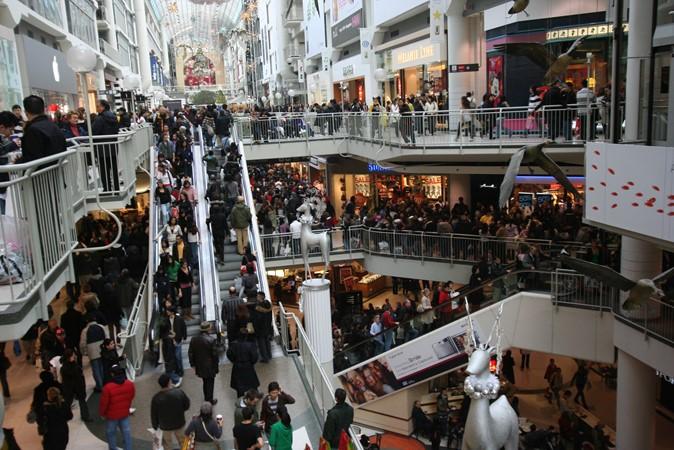
4 minute read
Are the Deals Really Worth It?
By Natalia Binkowski
Mariah Carey’s “All I Want for Christmas Is You” is playing everywhere you go, painfully long lines, and mediocre deals - it’s that time of year! Every year, people get excited for Black Friday and Cyber Monday. They make lists of things they just need to buy. They fight their way through crowds for the hottest items on sale. They make sure that they are connected to the fastest Wi-Fi and that their credit cards ready. Many people are so focused on the deals that they don’t think about any of the impacts that Black Friday and Cyber Monday may have - especially on the environment.
One of the main problems when it comes to these crazy days of deals is the massive amount of shipping that must be done. The “U.S. Post Office estimates they'll deliver 15 billion pieces of mail and 900 million packages between Thanksgiving and the New Year” (Gibbens). Places like Amazon and Walmart get a huge influx of orders that must be fulfilled quickly because of expedited shipping options. Last year, Amazon revealed that “customers ordered more than 180 million items during the five days from Thanksgiving to Cyber Monday” (Picchi). This is just from Amazon alone. Because two-day shipping is free for Amazon Prime members, lots of people choose this option (CBC News). In turn, this affects the environment negatively because of increased carbon emissions due to things like manufacturing, transportation, and all else. Some of the most commonly purchased items during these sales tend to be electronics. People buy new phones, computers, tablets, and televisions, but eventually these electronics will turn into electronic waste (e-waste). “Only about 20 percent of e-waste is recycled” (Gibbens), which means that the rest that is thrown into landfills has the potential of leaking toxic chemicals into the soil, water, and air. Next, clothes are also a popular purchase for many people. Most people go to malls where they sell clothes rapidly and in large quantities - this is fast fashion. Fast fashion is damaging to our environment as, “every year, global emissions from textile production are equivalent to 1.2 billion tons of CO2” (Chinasamy). During the holidays, there is generally a large overconsumption of unnecessary goods. Overall, “fashion production uses lots of precious fresh water and pollutes rivers and seas with toxic chemicals” (Brodde), which can be prevented with more awareness and less demand.
Volume 12, Issue 3 Finally, plastic is used for packaging almost all the items purchased online and bagging most items in store (unless bags from other eco-friendly materials are used). A lot of plastic is wasted during the holidays. Typically, “Americans throw away 25% more trash during the Thanksgiving to New Year's holiday period than any other time of year. The extra waste amounts to 25 million tons of garbage, or about 1 million extra tons per week” (Stanford). This is a tremendous amount of garbage - largely consisting of plastics. If everyone was more aware of the problems caused by all the plastic use - even just during the holidays - and decreased the number of products they buy that are made of plastic or are wrapped in plastic, a huge difference would already be made! If you would like to make even a small difference this year, here are a few tips that you can follow. You can “pass up the opportunity of one-day delivery and group your purchases into as few orders as possible” (Fecht). As mentioned previously, one-day, rushed delivery is more harmful to the environment than regular shipping (that typically takes about a week). Limiting consumption of electronics is also beneficial to the environment because it will limit the ewaste that is generated yearly (Fecht). After a while, chemicals from this e-waste can cause health and environmental issues. Lastly, try buying more experience-based gifts for the important people in your life. Not only will this create less waste, but it will provide them with long-lasting memories that they will cherish forever.

Works Cited
Brodde, K. (2019, November 15). Black Friday: Breathe, take a break – the planet can't handle it anymore. Retrieved from https://www.greenpeace.org/international/story/6855/black-friday-breathe-take-a-break-the-planet-cant-handle-itanymore/. CBC/Radio Canada. (2018, November 28). Online shopping can be worse for the environment than going to the mall |
CBC News. Retrieved from https://www.cbc.ca/news/technology/online-shopping-carbon-footprint-1.4914942. Chinasamy, J., Chinasamy, J., & Chinasamy, J. (2019, September 12). London Fashion Week: Fast facts about fast fashion. Retrieved from https://unearthed.greenpeace.org/2019/09/12/fast-facts-about-fast-fashion/. Fecht, S., & Fecht, S. (2019, November 20). 16 Ideas to For a More Sustainable Thanksgiving and Black Friday. Retrieved from https://blogs.ei.columbia.edu/2019/11/20/sustainable-thanksgiving-ideas/. Gibbens, S. (2018, November 21). Holiday shopping hurts the environment-but you can help. Retrieved from https:// www.nationalgeographic.com/environment/2018/11/how-black-friday-cyber-monday-impacts-environment/#close. NPR. (2018, November 26). Super-Fast Shipping Comes with High Environmental Costs. Retrieved from https:// www.npr.org/2018/11/26/670991367/super-fast-shipping-comes-with-high-environmental-costs. Picchi, A. (2018, November 27). Amazon says Cyber Monday, Black Friday broke sales records. Retrieved from https:// www.cbsnews.com/news/amazon-says-cyber-monday-black-friday-broke-sales-records/. Stanford. (n.d.). Frequently Asked Questions: Holiday Waste Prevention. Retrieved from https://lbre.stanford.edu/ pssistanford-recycling/frequently-asked-questions/frequently-asked-questions-holiday-waste-prevention.










